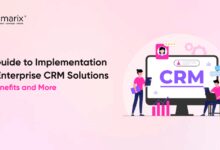Enterprise CRM Systems: 7 Powerful Benefits You Can’t Ignore
In today’s hyper-competitive business landscape, enterprise CRM systems are no longer a luxury—they’re a necessity. These powerful platforms transform how large organizations manage customer relationships, streamline operations, and drive revenue growth with precision and scalability.
What Are Enterprise CRM Systems?

Enterprise CRM systems are advanced customer relationship management platforms designed specifically for large-scale organizations with complex operations, vast customer databases, and multi-departmental workflows. Unlike standard CRM tools built for small businesses or startups, enterprise CRM systems offer robust features, deep customization, integration capabilities, and high-level security to meet the demands of global corporations.
Definition and Core Purpose
At its core, an enterprise CRM system is a centralized software solution that consolidates customer data from multiple touchpoints—sales, marketing, customer service, e-commerce, and social media—into a single, unified platform. This enables organizations to gain a 360-degree view of their customers, improve engagement, and deliver personalized experiences at scale.
- Centralizes customer interactions across departments
- Enables data-driven decision-making through analytics
- Supports automation of repetitive tasks like lead scoring and follow-ups
These systems are engineered to handle high transaction volumes, support thousands of users simultaneously, and integrate seamlessly with legacy systems such as ERP, HRIS, and supply chain management tools.
How They Differ from Standard CRM Tools
While small business CRMs focus on simplicity and ease of use, enterprise CRM systems prioritize scalability, security, and advanced functionality. For example, a startup might use a basic CRM like HubSpot or Zoho to track leads and send emails. In contrast, a multinational corporation would require an enterprise-grade solution like Salesforce Sales Cloud, Microsoft Dynamics 365, or Oracle CX to manage global sales pipelines, complex compliance requirements, and AI-powered forecasting.
- Enterprise CRMs support multi-currency, multi-language, and multi-region operations
- They offer granular user permissions and role-based access control
- Advanced APIs allow integration with custom-built internal applications
“Enterprise CRM isn’t just about managing contacts—it’s about orchestrating entire customer lifecycles across continents and channels.” — Gartner Research, 2023
Key Features of Enterprise CRM Systems
The strength of enterprise CRM systems lies in their comprehensive feature set, which goes far beyond contact management. These platforms are built to support end-to-end customer journey mapping, predictive analytics, and cross-functional collaboration.
Advanced Analytics and Reporting
One of the most powerful aspects of enterprise CRM systems is their ability to process massive datasets and generate actionable insights. With built-in business intelligence tools, companies can track KPIs like customer lifetime value (CLV), churn rate, conversion rates, and sales pipeline health in real time.
- Customizable dashboards provide executives with at-a-glance performance metrics
- Predictive analytics forecast future sales trends based on historical data
- AI-driven recommendations suggest optimal next steps for sales reps
For instance, Salesforce Einstein Analytics uses machine learning to identify patterns in customer behavior, enabling proactive outreach before a client even considers switching vendors. This level of insight is critical for enterprises aiming to stay ahead in competitive markets.
Automation and Workflow Management
Manual processes slow down large organizations. Enterprise CRM systems automate routine tasks such as lead assignment, email campaigns, service ticket routing, and approval workflows. This not only increases efficiency but also reduces human error.
- Automated lead scoring prioritizes high-value prospects
- Service-level agreement (SLA) tracking ensures timely responses
- Approval chains for pricing discounts or contract changes are enforced automatically
Take Microsoft Dynamics 365 as an example—it allows businesses to create complex workflow rules that trigger actions across departments. When a high-priority support ticket is logged, the system can automatically notify a senior technician, escalate the issue if unresolved within two hours, and update the customer via SMS—all without human intervention.
Integration Capabilities with Other Systems
No enterprise operates in isolation. Enterprise CRM systems must connect with ERP systems (like SAP or Oracle), marketing automation platforms (like Marketo or Pardot), e-commerce engines (like Magento or Shopify), and communication tools (like Slack or Teams).
- Real-time data sync between CRM and ERP ensures accurate inventory and order tracking
- Marketing teams can launch targeted campaigns using CRM-segmented audiences
- Customer service agents access complete purchase history directly from the CRM
According to a McKinsey report, companies that integrate CRM with other enterprise systems see up to 30% higher customer retention rates due to improved service consistency.
Top Enterprise CRM Platforms in 2024
The market for enterprise CRM systems is dominated by a few key players, each offering unique strengths depending on industry, budget, and technical requirements. Choosing the right platform depends on your organization’s size, goals, and existing tech stack.
Salesforce Sales Cloud
Salesforce remains the undisputed leader in enterprise CRM systems, powering over 150,000 companies worldwide. Its Sales Cloud module offers end-to-end sales force automation, AI-powered forecasting, and deep customization through the Lightning Platform.
- Highly scalable with global data centers
- Extensive AppExchange marketplace with thousands of third-party integrations
- Strong AI capabilities via Einstein AI
Salesforce excels in industries like financial services, healthcare, and technology, where compliance and data governance are paramount. It supports HIPAA, GDPR, and SOC 2 standards out of the box.
Microsoft Dynamics 365
Microsoft Dynamics 365 stands out for organizations already invested in the Microsoft ecosystem. Its seamless integration with Office 365, Azure, and Power BI makes it a natural choice for enterprises using Microsoft products extensively.
- Tight integration with Outlook, Excel, and Teams enhances user adoption
- Power Platform allows non-developers to build custom apps and workflows
- Strong ERP-CRM convergence with Dynamics 365 Finance and Supply Chain
Dynamics 365 is particularly popular in manufacturing, retail, and public sector organizations. A case study from Microsoft’s customer portal shows how a global retailer reduced order processing time by 40% after implementing Dynamics 365.
Oracle CX (Customer Experience)
Oracle CX is a comprehensive suite that includes service, sales, marketing, and loyalty modules. It’s ideal for large enterprises with complex customer journeys, especially in telecommunications, banking, and travel sectors.
- Unified data model across all CX modules ensures consistency
- Advanced AI for sentiment analysis and chatbot interactions
- Built-in loyalty program management for customer retention
Oracle’s strength lies in its ability to handle high-volume transaction environments. For example, a major airline uses Oracle CX to manage over 2 million customer interactions per day across call centers, mobile apps, and websites.
Benefits of Implementing Enterprise CRM Systems
Deploying an enterprise CRM system is a strategic investment that yields measurable returns across multiple business functions. From boosting sales productivity to enhancing customer satisfaction, the advantages are both immediate and long-term.
Improved Customer Insights and Personalization
With all customer data centralized, enterprises can create detailed profiles that include purchase history, communication preferences, support tickets, and social media activity. This enables hyper-personalized marketing and service delivery.
- Segment customers based on behavior, demographics, and lifecycle stage
- Deliver personalized product recommendations via email or web
- Anticipate needs using predictive analytics (e.g., suggesting upgrades before renewal)
A study by Boston Consulting Group found that companies using CRM-driven personalization achieve 6–10% higher revenue growth compared to peers.
Increased Sales Efficiency and Forecast Accuracy
Sales teams equipped with enterprise CRM systems spend less time on administrative tasks and more time selling. Automated lead routing, real-time pipeline visibility, and AI-assisted forecasting significantly improve performance.
- Sales reps close deals 20–30% faster due to better lead prioritization
- Managers gain accurate forecasts with confidence levels based on historical win rates
- Commission tracking and quota management become transparent and automated
For example, a Fortune 500 pharmaceutical company reported a 27% increase in sales productivity within six months of deploying Salesforce across its global field teams.
Enhanced Collaboration Across Departments
One of the biggest challenges in large organizations is siloed information. Enterprise CRM systems break down these barriers by providing a shared platform where sales, marketing, customer service, and finance can collaborate effectively.
- Marketing can see which leads converted and refine campaigns accordingly
- Customer service has full context of past interactions before engaging
- Finance teams access real-time revenue data for accurate reporting
This cross-functional visibility leads to faster resolution times, consistent messaging, and a unified brand experience.
Challenges in Deploying Enterprise CRM Systems
Despite their benefits, implementing enterprise CRM systems is not without obstacles. Organizations often underestimate the complexity involved in deployment, change management, and long-term maintenance.
High Implementation Costs and Time
Enterprise CRM systems require significant upfront investment—not just in licensing fees, but also in consulting, customization, data migration, and training. A typical implementation can cost anywhere from $100,000 to several million dollars, depending on scale.
- Custom development and integration with legacy systems add to costs
- Data cleansing and migration can take months for large datasets
- Ongoing maintenance and upgrades require dedicated IT resources
According to Gartner, the average time to fully deploy an enterprise CRM is 6–12 months, with larger organizations taking up to 18 months.
User Adoption and Training Barriers
Even the most advanced CRM fails if employees don’t use it. Resistance to change, lack of training, and poor user experience are common adoption hurdles.
- Sales reps may revert to spreadsheets if the CRM feels cumbersome
- Insufficient training leads to underutilization of key features
- Complex interfaces reduce productivity instead of enhancing it
To combat this, successful companies invest in change management programs, super-user networks, and phased rollouts. Gamification and incentive programs also boost engagement.
Data Security and Compliance Risks
With vast amounts of sensitive customer data stored in enterprise CRM systems, security is a top concern. Breaches can result in financial penalties, reputational damage, and loss of customer trust.
- CRMs must comply with regulations like GDPR, CCPA, HIPAA, and PCI-DSS
- Role-based access controls prevent unauthorized data access
- Regular audits and encryption protocols are essential
Organizations must work closely with vendors to ensure compliance and conduct regular penetration testing.
How to Choose the Right Enterprise CRM System
Selecting the right enterprise CRM system requires a strategic approach that aligns technology with business objectives. Rushing into a decision without proper evaluation can lead to costly mistakes and low ROI.
Assessing Business Needs and Goals
Start by defining what you want to achieve: Is it improving sales productivity? Enhancing customer service? Scaling marketing automation? Your goals will dictate which features are most important.
- Map current customer journey stages and identify pain points
- Involve stakeholders from sales, marketing, IT, and customer service
- Prioritize must-have vs. nice-to-have features
For example, a B2B software company might prioritize lead scoring and pipeline management, while a telecom provider may focus on service case resolution and churn prediction.
Evaluating Scalability and Customization Options
Your CRM should grow with your business. Evaluate whether the platform can handle increased users, data volume, and new geographies without performance degradation.
- Check for multi-tenant architecture and cloud scalability
- Assess customization tools like drag-and-drop builders or API access
- Ensure support for industry-specific workflows (e.g., insurance claims or medical billing)
Platforms like Salesforce and Dynamics 365 offer extensive customization through low-code/no-code tools, making them adaptable to evolving needs.
Vendor Support and Long-Term Viability
Choose a vendor with a proven track record of innovation, customer support, and financial stability. Review SLAs, support response times, and availability of training resources.
- Look for vendors with 24/7 support and dedicated account managers
- Check user reviews on sites like Gartner Peer Insights or TrustRadius
- Consider the vendor’s roadmap for AI, mobile access, and integration
A reliable vendor partnership ensures your CRM remains future-proof and aligned with emerging technologies.
Future Trends in Enterprise CRM Systems
The evolution of enterprise CRM systems is being driven by advancements in artificial intelligence, cloud computing, and customer expectations. Staying ahead of these trends is crucial for maintaining a competitive edge.
AI and Machine Learning Integration
AI is transforming enterprise CRM systems from reactive tools to proactive advisors. From chatbots handling routine inquiries to AI predicting customer churn, the applications are vast.
- Natural language processing (NLP) enables voice-to-CRM updates
- AI analyzes call transcripts to identify customer sentiment
- Smart assistants suggest optimal times to contact leads
Salesforce’s Einstein AI and Microsoft’s Copilot for Dynamics 365 are leading this shift, enabling users to get insights and automate tasks using conversational commands.
Cloud-Native and Mobile-First Architectures
Modern enterprise CRM systems are increasingly cloud-native, offering greater flexibility, faster updates, and lower infrastructure costs. Mobile-first design ensures that field sales reps and remote agents can access the CRM from any device.
- Offline mobile access allows data entry without internet connectivity
- Push notifications keep teams updated on critical events
- Responsive design ensures usability across smartphones and tablets
Cloud deployment also enables rapid scaling during peak seasons, such as holiday sales or product launches.
Hyper-Personalization and Predictive Engagement
The future of CRM lies in delivering the right message, to the right person, at the right time. Predictive engagement engines use behavioral data to trigger personalized interactions before the customer even asks.
- CRM systems will anticipate customer needs based on past behavior
- Dynamic content generation will tailor emails and offers in real time
- Integration with IoT devices will provide contextual data (e.g., smart appliance usage)
As Forrester predicts, by 2026, over 60% of enterprise CRMs will use predictive engagement to reduce churn and increase upsell rates.
What are enterprise CRM systems?
Enterprise CRM systems are advanced software platforms designed for large organizations to manage customer relationships at scale. They centralize customer data, automate workflows, and provide deep analytics to improve sales, marketing, and service operations.
How do enterprise CRM systems improve sales efficiency?
They enhance sales efficiency by automating lead management, providing real-time pipeline visibility, enabling AI-driven forecasting, and reducing manual tasks—allowing sales teams to focus on closing deals rather than data entry.
Which industries benefit most from enterprise CRM systems?
Industries with complex customer interactions and large data volumes—such as finance, healthcare, telecommunications, retail, and technology—benefit the most from enterprise CRM systems due to their scalability and integration capabilities.
Are enterprise CRM systems secure?
Yes, enterprise CRM systems are built with robust security features including encryption, role-based access control, audit trails, and compliance with global standards like GDPR, HIPAA, and SOC 2 to protect sensitive customer data.
What is the average cost of an enterprise CRM system?
The cost varies widely based on vendor, scale, and customization. Licensing alone can range from $100 to $300 per user per month, with total implementation costs often exceeding $500,000 for large deployments when factoring in consulting, integration, and training.
Enterprise CRM systems are no longer optional tools—they are strategic assets that drive customer-centric transformation across large organizations. From Salesforce to Microsoft Dynamics 365, these platforms offer powerful features like AI-driven insights, workflow automation, and cross-departmental collaboration. While challenges like high costs and user adoption exist, the long-term benefits in efficiency, revenue growth, and customer satisfaction far outweigh the risks. As AI, cloud computing, and predictive analytics continue to evolve, the future of enterprise CRM systems will be defined by hyper-personalization, real-time intelligence, and seamless integration across the digital ecosystem. Choosing the right CRM requires careful evaluation of business needs, scalability, and vendor support—but when implemented correctly, it becomes the backbone of sustainable growth and competitive advantage.
Further Reading:


